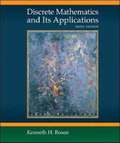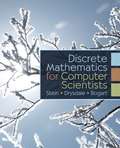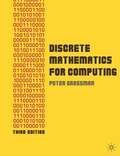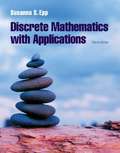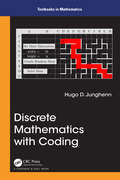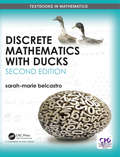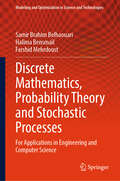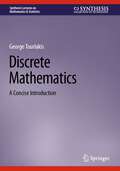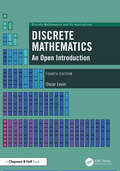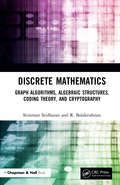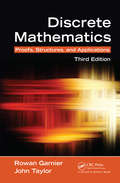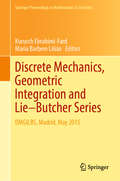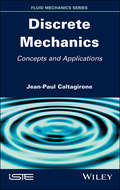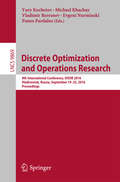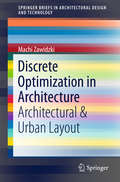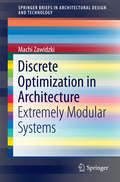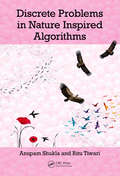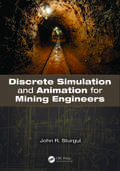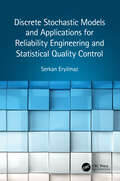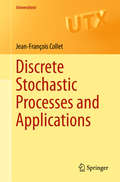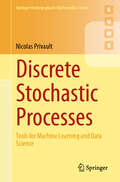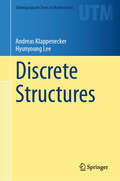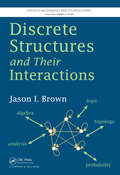- Table View
- List View
Discrete Mathematics and its Applications (Sixth Edition)
by Kenneth H. RosenThis book gives a focused introduction to the primary themes in a discrete mathematics course and demonstrates the relevance and practicality of discrete mathematics to a wide variety of real-world applications.
Discrete Mathematics for Computer Scientists
by Clifford Stein Robert L. Drysdale Kenneth BogartDiscrete Mathematics for Computer Scientists provides computer science students the foundation they need in discrete mathematics. It gives thorough coverage to topics that have great importance to computer scientists and provides a motivating computer science example for each math topic.
Discrete Mathematics for Computing (3rd Edition)
by Peter Grossman<p>Palgrave Macmillan Discrete Mathematics for Computing is suitable for students taking a one-semester introductory course in discrete mathematics, particularly those studying Computing and Informations Systems. It presents the essential mathematics needed for computing in a style suitable for students with only a moderate background in the subject. <p>Material is introduced at a gentle pace and in an informal style, without compromising mathematical integrity. The text includes many examples of how the theory is applied to problems in computing. This third edition includes: a new expanded section on encryption, additional examples to illustrate key concepts, new exercises at a variety of levels. <p>Peter Grossman has worked in universities and industry as a mathematician and computing professional. As a lecturer in mathematics, he was responsible for coordinating and developing mathematics courses for computing students. He has applied his skills in areas as diverse as calculator design, irrigation systems and underground mine layouts.
Discrete Mathematics with Applications (4th edition)
by Susanna S. EppThis textbook for computer science and math majors describes processes that consist of a sequence of individual steps, and explains the concepts of logic, proof, induction, recursion, algorithms, and discrete structures. The third edition adds a chapter on finite-state automata, and sections on modular arithmetic and cryptography, expected value, and conditional probability. Annotation ©2004 Book News, Inc., Portland, OR (booknews.com)
Discrete Mathematics with Applications (Mathematics Ser.)
by Susanna S. EppNIMAC-sourced textbook <P><P>Susanna Epp's DISCRETE MATHEMATICS, THIRD EDITION provides a clear introduction to discrete mathematics. Renowned for her lucid, accessible prose, Epp explains complex, abstract concepts with clarity and precision. This book presents not only the major themes of discrete mathematics, but also the reasoning that underlies mathematical thought. Students develop the ability to think abstractly as they study the ideas of logic and proof. While learning about such concepts as logic circuits and computer addition, algorithm analysis, recursive thinking, computability, automata, cryptography, and combinatorics, students discover that the ideas of discrete mathematics underlie and are essential to the science and technology of the computer age. Overall, Epp's emphasis on reasoning provides students with a strong foundation for computer science and upper-level mathematics courses. <P><P><i>Advisory: Please be advised that the audio format is the only format working at this time. We apologize for any inconvenience and hope to have a fix soon.</i>
Discrete Mathematics with Coding (Textbooks in Mathematics)
by Hugo D JunghennThis book, for a first undergraduate course in Discrete Mathematics, systematically exploits the relationship between discrete mathematics and computer programming. Unlike most discrete mathematics texts focusing on one of the other, the book explores the rich and important connection between these two disciplines and shows how each discipline reinforces and enhances the other. The mathematics in the book is self-contained, requiring only a good background in precalculus and some mathematical maturity. New mathematical topics are introduced as needed. The coding language used is VBA Excel. The language is easy to learn, has intuitive commands, and the reader can develop interesting programs from the outset. Additionally, the spreadsheet platform in Excel makes for convenient and transparent data input and output and provides a powerful venue for complex data manipulation. Manipulating data is greatly simplified using spreadsheet features and visualizing the data can make programming and debugging easier. The VBA language is seamlessly integrated into the spreadsheet environment with no other resources required. Furthermore, as some of the modules in the book show, intricate patterns, graphs, and animation in the form of moving cells is possible. Features Introduces coding in VBA Excel assuming no previous coding experience. Develops programs in Linear Analysis, Logic, Combinatorics, Probability, and Number Theory. Contains over 90 fully tested and debugged programs. The code for these is as well as the exercises is available on the author's website. Contains numerous examples that gradually introduce the reader to coding techniques. Includes programs that solve systems of linear equations, linear programming problems, combinatorial problems, Venn diagram problems and programs that produce truth tables from logic statements and logic statements from switching and gate circuits, encrypt and decrypt messages and simulate probability experiments.
Discrete Mathematics with Ducks (Textbooks in Mathematics)
by Sarah-Marie Belcastro<p>Discrete Mathematics with Ducks, Second Edition is a gentle introduction for students who find the proofs and abstractions of mathematics challenging. At the same time, it provides stimulating material that instructors can use for more advanced students. The first edition was widely well received, with its whimsical writing style and numerous exercises and materials that engaged students at all levels. <p>The new, expanded edition continues to facilitate effective and active learning. It is designed to help students learn about discrete mathematics through problem-based activities. These are created to inspire students to understand mathematics by actively practicing and doing, which helps students better retain what they’ve learned. As such, each chapter contains a mixture of discovery-based activities, projects, expository text, in-class exercises, and homework problems. The author’s lively and friendly writing style is appealing to both instructors and students alike and encourages readers to learn. The book’s light-hearted approach to the subject is a guiding principle and helps students learn mathematical abstraction.</p>
Discrete Mathematics, Probability Theory and Stochastic Processes: For Applications in Engineering and Computer Science (Modeling and Optimization in Science and Technologies #20)
by Samir Brahim Belhaouari Halima Bensmail Farshid MehrdoustThis book provides a comprehensive overview of discrete mathematics, probability theory, and stochastic processes, covering a wide range of topics in each area. It is designed to be a self-contained resource for students and professionals wishing to improve their understanding of these important mathematical concepts. The book takes a practical approach to the subject matter, providing real-world examples and applications to help readers understand how these mathematical concepts are used in various fields, such as computer science, engineering, and finance.
Discrete Mathematics: A Concise Introduction (Synthesis Lectures on Mathematics & Statistics)
by George TourlakisThis book is ideal for a first or second year discrete mathematics course for mathematics, engineering, and computer science majors. The author has extensively class-tested early conceptions of the book over the years and supplements mathematical arguments with informal discussions to aid readers in understanding the presented topics. “Safe” – that is, paradox-free – informal set theory is introduced following on the heels of Russell’s Paradox as well as the topics of finite, countable, and uncountable sets with an exposition and use of Cantor’s diagonalisation technique. Predicate logic “for the user” is introduced along with axioms and rules and extensive examples. Partial orders and the minimal condition are studied in detail with the latter shown to be equivalent to the induction principle. Mathematical induction is illustrated with several examples and is followed by a thorough exposition of inductive definitions of functions and sets. Techniques for solving recurrence relations including generating functions, the O- and o-notations, and trees are provided. Over 200 end of chapter exercises are included to further aid in the understanding and applications of discrete mathematics.
Discrete Mathematics: An Open Introduction (Discrete Mathematics and Its Applications)
by Oscar LevinDiscrete Mathematics: An Open Introduction, Fourth Edition aims to provide an introduction to select topics in discrete mathematics at a level appropriate for first or second year undergraduate math and computer science majors, especially those who intend to teach middle and high school mathematics. The book began as a set of notes for the Discrete Mathematics course at the University of Northern Colorado. This course serves both as a survey of the topics in discrete math and as the “bridge” course for math majors. Features Uses problem-oriented and inquiry-based methods to teach the concepts. Suitable for undergraduates in mathematics and computer science. New to the 4th edition Large scale restructuring. Contains more than 750 exercises and examples. New sections on probability, relations, and discrete structures and their proofs.
Discrete Mathematics: Graph Algorithms, Algebraic Structures, Coding Theory, and Cryptography
by R. Balakrishnan Sriraman SridharanConveying ideas in a user-friendly style, this book has been designed for a course in Applied Algebra. The book covers graph algorithms, basic algebraic structures, coding theory and cryptography. It will be most suited for senior undergraduates and beginning graduate students in mathematics and computer science as also toindividuals who want to have a knowledge of the below-mentioned topics. Provides a complete discussion on several graph algorithms such as Prims algorithm and Kruskals algorithm for sending a minimum cost spanning tree in a weighted graph, Dijkstras single source shortest path algorithm, Floyds algorithm, Warshalls algorithm, Kuhn-Munkres Algorithm. In addition to DFS and BFS search, several applications of DFS and BFS are also discussed. Presents a good introduction to the basic algebraic structures, namely, matrices, groups, rings, fields including finite fields as also a discussion on vector spaces and linear equations and their solutions. Provides an introduction to linear codes including cyclic codes. Presents a description of private key cryptosystems as also a discussion on public key cryptosystems such as RSA, ElGamal and Miller-Rabin. Finally, the Agrawal-KayalSaxena algorithm (AKS Algorithm) for testing if a givenpositive integer is prime or not in polynomial time is presented- the first time in a textbook. Two distinguished features of the book are: Illustrative examples have been presented throughout the book to make the readers appreciate the concepts described. Answers to all even-numbered exercises in all the chapters are given.
Discrete Mathematics: Proofs, Structures and Applications, Third Edition
by John Taylor Rowan GarnierTaking an approach to the subject that is suitable for a broad readership, Discrete Mathematics: Proofs, Structures, and Applications, Third Edition provides a rigorous yet accessible exposition of discrete mathematics, including the core mathematical foundation of computer science. The approach is comprehensive yet maintains an easy-to-follow prog
Discrete Mechanics, Geometric Integration and Lie–Butcher Series: Dmgilbs, Madrid, May 2015 (Springer Proceedings in Mathematics & Statistics #267)
by Kurusch Ebrahimi-Fard María Barbero LiñánThis volume resulted from presentations given at the international “Brainstorming Workshop on New Developments in Discrete Mechanics, Geometric Integration and Lie–Butcher Series”, that took place at the Instituto de Ciencias Matemáticas (ICMAT) in Madrid, Spain. It combines overview and research articles on recent and ongoing developments, as well as new research directions. Why geometric numerical integration? In their article of the same title Arieh Iserles and Reinout Quispel, two renowned experts in numerical analysis of differential equations, provide a compelling answer to this question. After this introductory chapter a collection of high-quality research articles aim at exploring recent and ongoing developments, as well as new research directions in the areas of geometric integration methods for differential equations, nonlinear systems interconnections, and discrete mechanics. One of the highlights is the unfolding of modern algebraic and combinatorial structures common to those topics, which give rise to fruitful interactions between theoretical as well as applied and computational perspectives. The volume is aimed at researchers and graduate students interested in theoretical and computational problems in geometric integration theory, nonlinear control theory, and discrete mechanics.
Discrete Mechanics: Concepts and Applications (Iste Ser.)
by Jean-Paul CaltagironeThe discrete vision of mechanics is based on the founding ideas of Galileo and the principles of relativity and equivalence, which postulate the equality between gravitational mass and inertial mass. To these principles are added the Hodge–Helmholtz decomposition, the principle of accumulation of constraints and the hypothesis of the duality of physical actions. These principles make it possible to establish the equation of motion based on the conservation of acceleration considered as an absolute quantity in a local frame of reference, in the form of a sum of the gradient of the scalar potential and the curl of the vector potential. These potentials, which represent the constraints of compression and rotation, are updated from the discrete operators. Discrete Mechanics: Concepts and Applications shows that this equation of discrete motion is representative of the compressible or incompressible flows of viscous or perfect fluids, the state of stress in an elastic solid or complex fluid and the propagation of nonlinear waves.
Discrete Optimization and Operations Research
by Panos Pardalos Yury Kochetov Michael Khachay Vladimir Beresnev Evgeni NurminskiThis book constitutes the proceedings of the 9th International Conference on Discrete Optimization and Operations Research, DOOR 2016, held in Vladivostok, Russia, in September 2016. The 39 full papers presented in this volume were carefully reviewed and selected from 181 submissions. They were organized in topical sections named: discrete optimization; scheduling problems; facility location; mathematical programming; mathematical economics and games; applications of operational research; and short communications.
Discrete Optimization in Architecture
by Machi ZawidzkiThis book is comprised of two parts, both of which exploremodular systems: Pipe-Z (PZ) and Truss-Z (TZ), respectively. It presents severalmethods of creating PZ and TZ structures subjected to discrete optimization. The algorithms presented employ graph-theoretic and heuristic methods. Theunderlying idea of both systems is to create free-form structures using theminimal number of types of modular elements. PZ is more conceptual, as it formssingle-branch mathematical knots with a single type of module. Conversely, TZis a skeletal system for creating free-form pedestrian ramps and ramp networksamong any number of terminals in space. In physical space, TZ uses two types ofmodules that are mirror reflections of each other. The optimization criteriadiscussed include: the minimal number of units, maximal adherence to the givenguide paths, etc.
Discrete Optimization in Architecture
by Machi ZawidzkiThis book is comprised of two parts, both of which exploremodular systems: Pipe-Z (PZ) and Truss-Z (TZ), respectively. It presents severalmethods of creating PZ and TZ structures subjected to discrete optimization. The algorithms presented employ graph-theoretic and heuristic methods. Theunderlying idea of both systems is to create free-form structures using theminimal number of types of modular elements. PZ is more conceptual, as it formssingle-branch mathematical knots with a single type of module. Conversely, TZis a skeletal system for creating free-form pedestrian ramps and ramp networksamong any number of terminals in space. In physical space, TZ uses two types ofmodules that are mirror reflections of each other. The optimization criteriadiscussed include: the minimal number of units, maximal adherence to the givenguide paths, etc.
Discrete Problems in Nature Inspired Algorithms
by Ritu Tiwari Anupam ShuklaThis book includes introduction of several algorithms which are exclusively for graph based problems, namely combinatorial optimization problems, path formation problems, etc. Each chapter includes the introduction of the basic traditional nature inspired algorithm and discussion of the modified version for discrete algorithms including problems pertaining to discussed algorithms.
Discrete Simulation and Animation for Mining Engineers
by John SturgulGeneral Purpose Simulation System (GPSS) is a special computer programming language primarily used to simulate what can be classified as discrete systems. A discrete system is one where, at any given instant in time, a countable number of things can take place. The basic operation of a mine itself can be considered such a system. Discrete Simulatio
Discrete Stochastic Models and Applications for Reliability Engineering and Statistical Quality Control
by Serkan EryilmazDiscrete stochastic models are tools that allow us to understand, control, and optimize engineering systems and processes. This book provides real-life examples and illustrations of models in reliability engineering and statistical quality control and establishes a connection between the theoretical framework and their engineering applications. The book describes discrete stochastic models along with real-life examples and explores not only well-known models, but also comparatively lesser known ones. It includes definitions, concepts, and methods with a clear understanding of their use in reliability engineering and statistical quality control fields. Also covered are the recent advances and established connections between the theoretical framework of discrete stochastic models and their engineering applications. An ideal reference for researchers in academia and graduate students working in the fields of operations research, reliability engineering, quality control, and probability and statistics.
Discrete Stochastic Processes and Applications
by Jean-François ColletThis unique text for beginning graduate students gives a self-contained introduction to the mathematical properties of stochastics and presents their applications to Markov processes, coding theory, population dynamics, and search engine design. The book is ideal for a newly designed course in an introduction to probability and information theory. Prerequisites include working knowledge of linear algebra, calculus, and probability theory. The first part of the text focuses on the rigorous theory of Markov processes on countable spaces (Markov chains) and provides the basis to developing solid probabilistic intuition without the need for a course in measure theory. The approach taken is gradual beginning with the case of discrete time and moving on to that of continuous time. The second part of this text is more applied; its core introduces various uses of convexity in probability and presents a nice treatment of entropy.
Discrete Stochastic Processes: Tools for Machine Learning and Data Science (Springer Undergraduate Mathematics Series)
by Nicolas PrivaultThis text presents selected applications of discrete-time stochastic processes that involve random interactions and algorithms, and revolve around the Markov property. It covers recurrence properties of (excited) random walks, convergence and mixing of Markov chains, distribution modeling using phase-type distributions, applications to search engines and probabilistic automata, and an introduction to the Ising model used in statistical physics. Applications to data science are also considered via hidden Markov models and Markov decision processes. A total of 32 exercises and 17 longer problems are provided with detailed solutions and cover various topics of interest, including statistical learning.
Discrete Structures (Undergraduate Texts in Mathematics)
by Andreas Klappenecker Hyunyoung LeeThe aim of this text is to introduce discrete mathematics to beginning students of mathematics or computer science. It does this by bringing some coherency into the seemingly incongruent subjects that compose discrete math, such as logic, set theory, algebra, and combinatorics. It emphasizes their theoretical foundations and illustrates proofs along the way. The book prepares readers for the analysis of algorithms by discussing asymptotic analysis and a discrete calculus for sums. The book also deduces combinatorial methods from the foundations that are laid out. Unlike other texts on this subject, there is a greater emphasis on foundational material that leads to a better understanding. To further assist the reader in grasping and practicing concepts, roughly 690 exercises are provided at various levels of difficulty. Readers are encouraged to study the examples in the text and solve as many of the exercises as possible. The text is intended for freshman or sophomore undergraduate students in mathematics, computer science, or similar majors. The assumed background is precalculus. The chapter dependency chart included is designed to help students, independent readers, and instructors follow a systematic path for learning and teaching the material, with the option to explore material in later chapters.
Discrete Structures and Their Interactions
by Jason I. BrownDiscover the Connections between Different Structures and FieldsDiscrete Structures and Their Interactions highlights the connections among various discrete structures, including graphs, directed graphs, hypergraphs, partial orders, finite topologies, and simplicial complexes. It also explores their relationships to classical areas of mathematics,
Discrete Systems And Integrability
by J. Hietarinta N. Joshi F. W. NijhoffThis first introductory text to discrete integrable systems introduces key notions of integrability from the vantage point of discrete systems, also making connections with the continuous theory where relevant. While treating the material at an elementary level, the book also highlights many recent developments. Topics include: Darboux and Bäcklund transformations; difference equations and special functions; multidimensional consistency of integrable lattice equations; associated linear problems (Lax pairs); connections with Padé approximants and convergence algorithms; singularities and geometry; Hirota's bilinear formalism for lattices; intriguing properties of discrete Painlevé equations; and the novel theory of Lagrangian multiforms. The book builds the material in an organic way, emphasizing interconnections between the various approaches, while the exposition is mostly done through explicit computations on key examples. Written by respected experts in the field, the numerous exercises and the thorough list of references will benefit upper-level undergraduate, and beginning graduate students as well as researchers from other disciplines.
